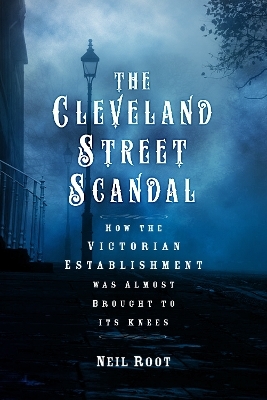
The Cleveland Street Scandal
How the Victorian Establishment was Almost Brought to its Knees
2025
The History Press Ltd (Verlag)
978-1-80399-664-6 (ISBN)
The History Press Ltd (Verlag)
978-1-80399-664-6 (ISBN)
- Noch nicht erschienen (ca. Juni 2025)
- Versandkostenfrei innerhalb Deutschlands
- Auch auf Rechnung
- Verfügbarkeit in der Filiale vor Ort prüfen
- Artikel merken
The first trade book in decades to explore the scandalous story of the Cleveland Street Scandal and how it almost destroyed the Establishment
It is the summer of 1889, and the royal family is in crisis. It is well known in polite society, in the drawing rooms of the great and the good, that the Prince of Wales and his aristocratic acolytes are regulars at a male brothel at 19 Cleveland Street in the heart of London’s West End.
Rumours in coffee shops and clubs of princely peccadilloes is common currency. An open secret. Bad behaviour by the gentry is expected and accepted, but it must remain an open secret. It must stay behind closed doors. The ruling classes can do what they will, but the rule that rules all is silence. The Establishment has always closed ranks when things got out of hand. A word here and there from powerful people always put rumours swiftly to bed. But this time it is different. The police are not playing ball.
Over the previous decades, the age-old tenets of Victorian social order were being eroded. The feeling that male homosexuality was an aristocratic vice that corrupted lower-class youths was growing. The press joined this popularist bandwagon, presenting rent boys as victims of the predatory upper class. Onto this stage walks Detective Inspector Frederick Abberline of Scotland Yard, fresh from leading the debacle of the Jack the Ripper investigation the previous year. This is to be his last case before he retires. His last chance to salvage his career after the humiliation of the Whitechapel murders.
Testimonies are taken from Lord Arthur Somerset, an equerry to the Prince of Wales and patron of the Cleveland Street club, and from the rent boys themselves. The fact that people are talking is unheard of. The indignation is picked up in parliament by Liberal MP, the writer, publisher and theatre owner Henry Labouchère, who is outraged. ‘19 Cleveland Street.’ he said, ‘is no obscure thoroughfare. It is nearly opposite the Middlesex Hospital.’ As the cigars are lit and port passed in White’s, Pratt’s, Boodle’s and the Carlton Club, nervousness is turning to fear. The reputations of men who rule half the world are under threat from a scandal that stretches all the way to the corridors of Buckingham Palace.
It is the summer of 1889, and the royal family is in crisis. It is well known in polite society, in the drawing rooms of the great and the good, that the Prince of Wales and his aristocratic acolytes are regulars at a male brothel at 19 Cleveland Street in the heart of London’s West End.
Rumours in coffee shops and clubs of princely peccadilloes is common currency. An open secret. Bad behaviour by the gentry is expected and accepted, but it must remain an open secret. It must stay behind closed doors. The ruling classes can do what they will, but the rule that rules all is silence. The Establishment has always closed ranks when things got out of hand. A word here and there from powerful people always put rumours swiftly to bed. But this time it is different. The police are not playing ball.
Over the previous decades, the age-old tenets of Victorian social order were being eroded. The feeling that male homosexuality was an aristocratic vice that corrupted lower-class youths was growing. The press joined this popularist bandwagon, presenting rent boys as victims of the predatory upper class. Onto this stage walks Detective Inspector Frederick Abberline of Scotland Yard, fresh from leading the debacle of the Jack the Ripper investigation the previous year. This is to be his last case before he retires. His last chance to salvage his career after the humiliation of the Whitechapel murders.
Testimonies are taken from Lord Arthur Somerset, an equerry to the Prince of Wales and patron of the Cleveland Street club, and from the rent boys themselves. The fact that people are talking is unheard of. The indignation is picked up in parliament by Liberal MP, the writer, publisher and theatre owner Henry Labouchère, who is outraged. ‘19 Cleveland Street.’ he said, ‘is no obscure thoroughfare. It is nearly opposite the Middlesex Hospital.’ As the cigars are lit and port passed in White’s, Pratt’s, Boodle’s and the Carlton Club, nervousness is turning to fear. The reputations of men who rule half the world are under threat from a scandal that stretches all the way to the corridors of Buckingham Palace.
Neil Root was born in London in 1971. He is a journalist, having written features for national newspapers, magazines and websites, and a true crime historian. Two of his books have been longlisted for the CWA Gold Dagger for Non-Fiction.
| Erscheint lt. Verlag | 5.6.2025 |
|---|---|
| Zusatzinfo | 20 Illustrations, black and white |
| Verlagsort | Stroud |
| Sprache | englisch |
| Maße | 156 x 234 mm |
| Themenwelt | Geschichte ► Teilgebiete der Geschichte ► Kulturgeschichte |
| Sozialwissenschaften ► Soziologie ► Gender Studies | |
| Sozialwissenschaften ► Soziologie ► Makrosoziologie | |
| ISBN-10 | 1-80399-664-1 / 1803996641 |
| ISBN-13 | 978-1-80399-664-6 / 9781803996646 |
| Zustand | Neuware |
| Haben Sie eine Frage zum Produkt? |
Mehr entdecken
aus dem Bereich
aus dem Bereich
der stille Abschied vom bäuerlichen Leben in Deutschland
Buch | Hardcover (2023)
C.H.Beck (Verlag)
23,00 €
vom Mittelalter bis zur Gegenwart
Buch | Softcover (2024)
C.H.Beck (Verlag)
12,00 €
Die Revolution des Gemeinen Mannes
Buch | Softcover (2024)
C.H.Beck (Verlag)
12,00 €


